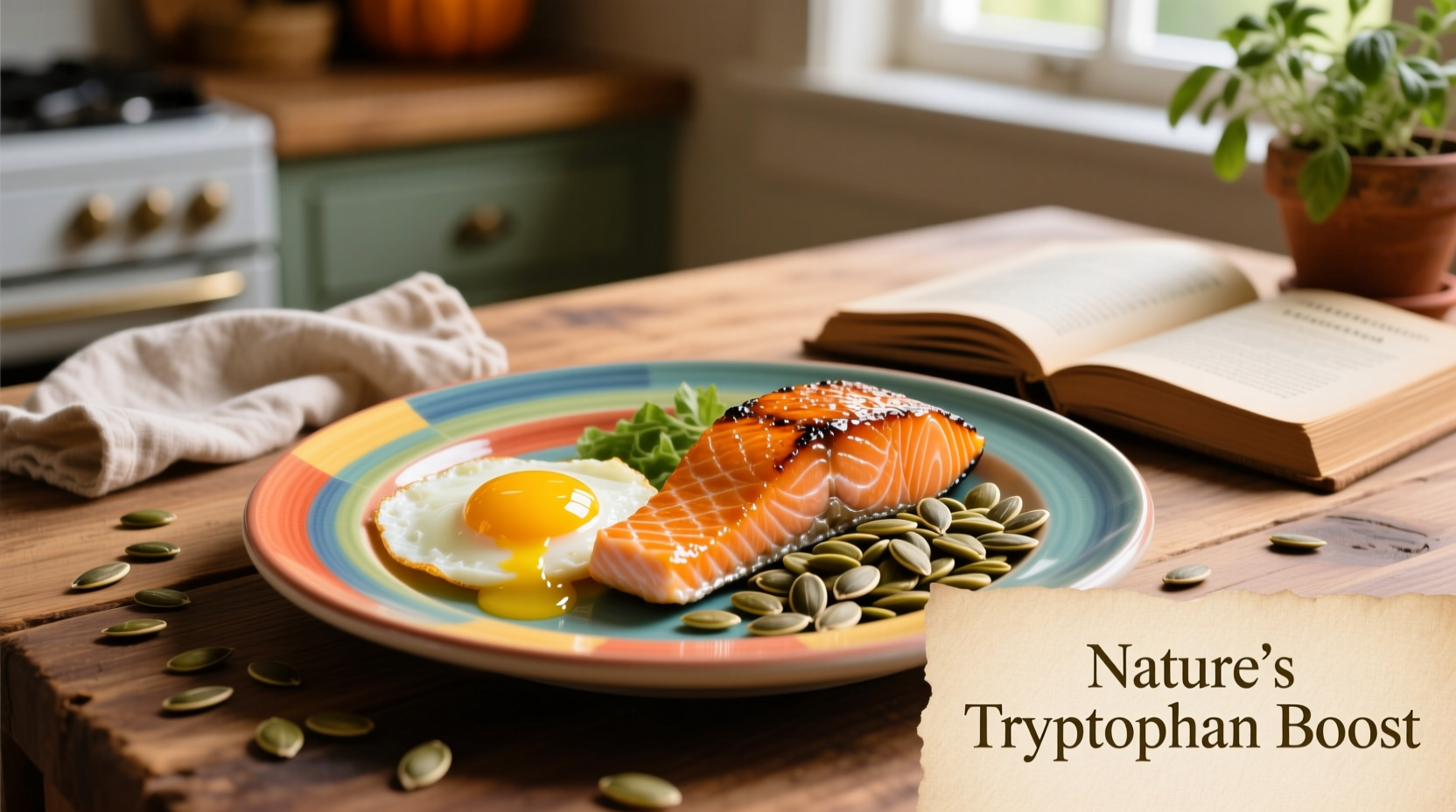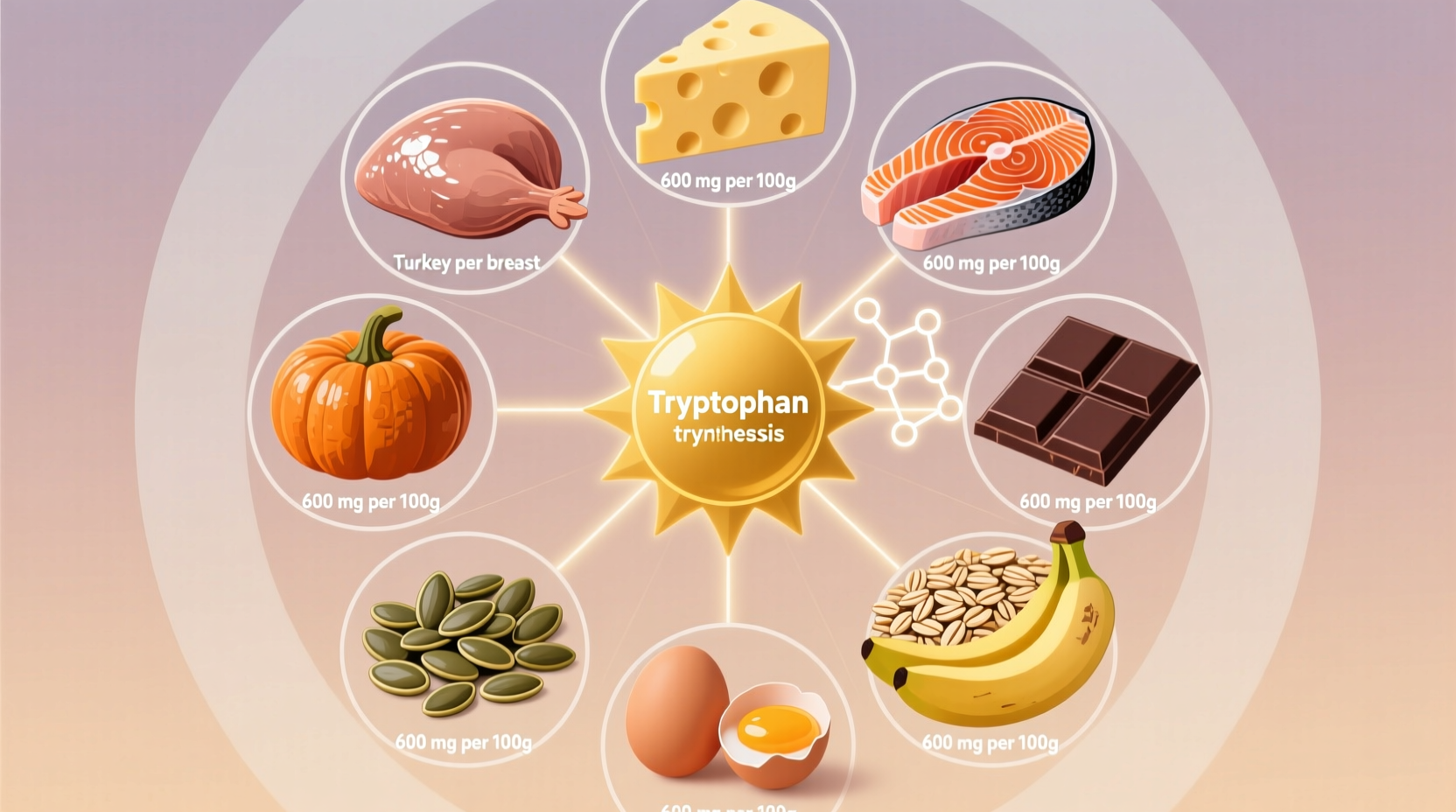Eggs, turkey, salmon, cheese, and pumpkin seeds are among the top food sources of tryptophan. Just one large egg provides 101mg of tryptophan, while 3 ounces of turkey delivers approximately 281mg. These natural sources support serotonin production for better mood regulation and sleep quality without supplements.
Why Tryptophan Matters for Your Health
Tryptophan stands as one of nine essential amino acids your body cannot produce on its own. This critical nutrient serves as the building block for serotonin—a neurotransmitter regulating mood, appetite, and sleep—and melatonin, your body's natural sleep hormone. According to the National Institutes of Health, adults require approximately 4-5 milligrams of tryptophan per kilogram of body weight daily to maintain optimal physiological function.
Unlike popular belief, tryptophan's effects aren't limited to post-Thanksgiving drowsiness. Research published in the Journal of Psychiatry & Neuroscience confirms that consistent dietary tryptophan intake supports emotional resilience and cognitive function. The key lies in strategic food combinations that enhance absorption—something you'll master by the end of this guide.
Top Animal-Based Tryptophan Powerhouses
Animal proteins typically offer higher tryptophan density per serving due to complete protein profiles. Here's what the USDA FoodData Central reveals about premium sources:
| Food Source | Serving Size | Tryptophan (mg) | Protein Quality Score |
|---|---|---|---|
| Raw Egg Whites | 100g | 303 | 1.0 |
| Salmon | 3 oz | 289 | 0.95 |
| Chicken Breast | 3 oz | 269 | 0.90 |
| Cheddar Cheese | 1 oz | 91 | 0.85 |
Eggs emerge as the most efficient tryptophan delivery system—each large egg contains 101mg while providing all nine essential amino acids. The whey protein in dairy products like cottage cheese offers superior bioavailability compared to other protein sources, making it ideal for evening consumption when melatonin production matters most.
Plant-Based Tryptophan Solutions for Every Diet
Vegans and vegetarians can access substantial tryptophan through strategic plant combinations. The Academy of Nutrition and Dietetics confirms that combining complementary proteins throughout the day ensures adequate tryptophan intake:
- Pumpkin seeds: 1 ounce delivers 194mg tryptophan plus magnesium for enhanced absorption
- Soy products: ½ cup tofu provides 170mg; tempeh offers 200mg per 3-ounce serving
- Chickpeas: 1 cup cooked contains 161mg alongside fiber that stabilizes blood sugar
- Oats: ½ cup dry oats offers 113mg with complex carbs to facilitate tryptophan transport to the brain
Contrary to outdated beliefs, plant proteins can meet tryptophan needs when properly combined. Pairing beans with rice creates a complete protein profile while the carbohydrate content in grains actually improves tryptophan's brain uptake—a crucial factor many nutrition guides overlook.

Maximizing Tryptophan Benefits Through Smart Pairing
Simply consuming tryptophan-rich foods isn't enough—the right combinations determine whether you'll experience mood and sleep benefits. Here's the science-backed approach:
The Carbohydrate Connection
Consuming tryptophan with complex carbohydrates triggers insulin release, which clears competing amino acids from your bloodstream. This allows more tryptophan to reach your brain. Opt for:
- Whole grain toast with turkey slices
- Oatmeal topped with pumpkin seeds
- Quinoa salad with chickpeas
Vitamin B6 Synergy
Vitamin B6 acts as a cofactor in converting tryptophan to serotonin. Include these B6-rich pairings:
- Salmon with roasted bell peppers (½ cup provides 30% DV of B6)
- Chickpea curry with turmeric-spiced cauliflower
- Scrambled eggs with spinach and bananas
Timing Your Tryptophan Intake for Specific Goals
Your objectives determine optimal consumption timing. Research from the Academy of Nutrition and Dietetics shows:
- For better sleep: Consume tryptophan-rich foods 2-3 hours before bed with complex carbs (e.g., cottage cheese with pineapple)
- For mood support: Include sources at breakfast and lunch (eggs with whole grain toast)
- For cognitive performance: Pair with healthy fats at midday (salmon salad with avocado)
Avoid consuming large protein meals right before bed—they can disrupt sleep architecture despite tryptophan content. The 2022 Nutrients journal study confirms that evening tryptophan intake works best when protein content stays moderate (15-20g) with higher carb ratios.
Debunking Common Tryptophan Myths
Let's clarify widespread misconceptions with evidence-based facts:
The Turkey Myth
Turkey contains no more tryptophan per gram than other poultry. The post-Thanksgiving drowsiness comes from carbohydrate overload from sides like stuffing and pie, not the turkey itself. USDA data shows chicken actually has slightly higher tryptophan density than turkey.
Supplements vs. Food Sources
While tryptophan supplements exist, the National Center for Complementary and Integrative Health warns they can cause serotonin syndrome when combined with certain medications. Whole foods provide balanced nutrient profiles that prevent adverse reactions.
Practical Meal Integration Strategies
Transform your diet with these effortless tryptophan-boosting meals:
Morning Mood Boosters
Start your day with scrambled eggs (213mg tryptophan) cooked in coconut oil, topped with pumpkin seeds, and served with sweet potato toast. The combination of quality protein, healthy fats, and complex carbs creates sustained serotonin production throughout your morning.
Afternoon Energy Stabilizers
Choose a salmon salad (289mg tryptophan) with mixed greens, avocado, and quinoa. The omega-3s in salmon enhance tryptophan conversion while the quinoa provides complementary amino acids and blood-sugar-stabilizing carbs.
Evening Wind-Down Meals
Prepare a light dinner of cottage cheese (122mg tryptophan per ½ cup) with sliced banana and walnuts 2-3 hours before bed. This combination provides optimal tryptophan-to-carb ratio without heavy digestion that could disrupt sleep.











 浙公网安备
33010002000092号
浙公网安备
33010002000092号 浙B2-20120091-4
浙B2-20120091-4